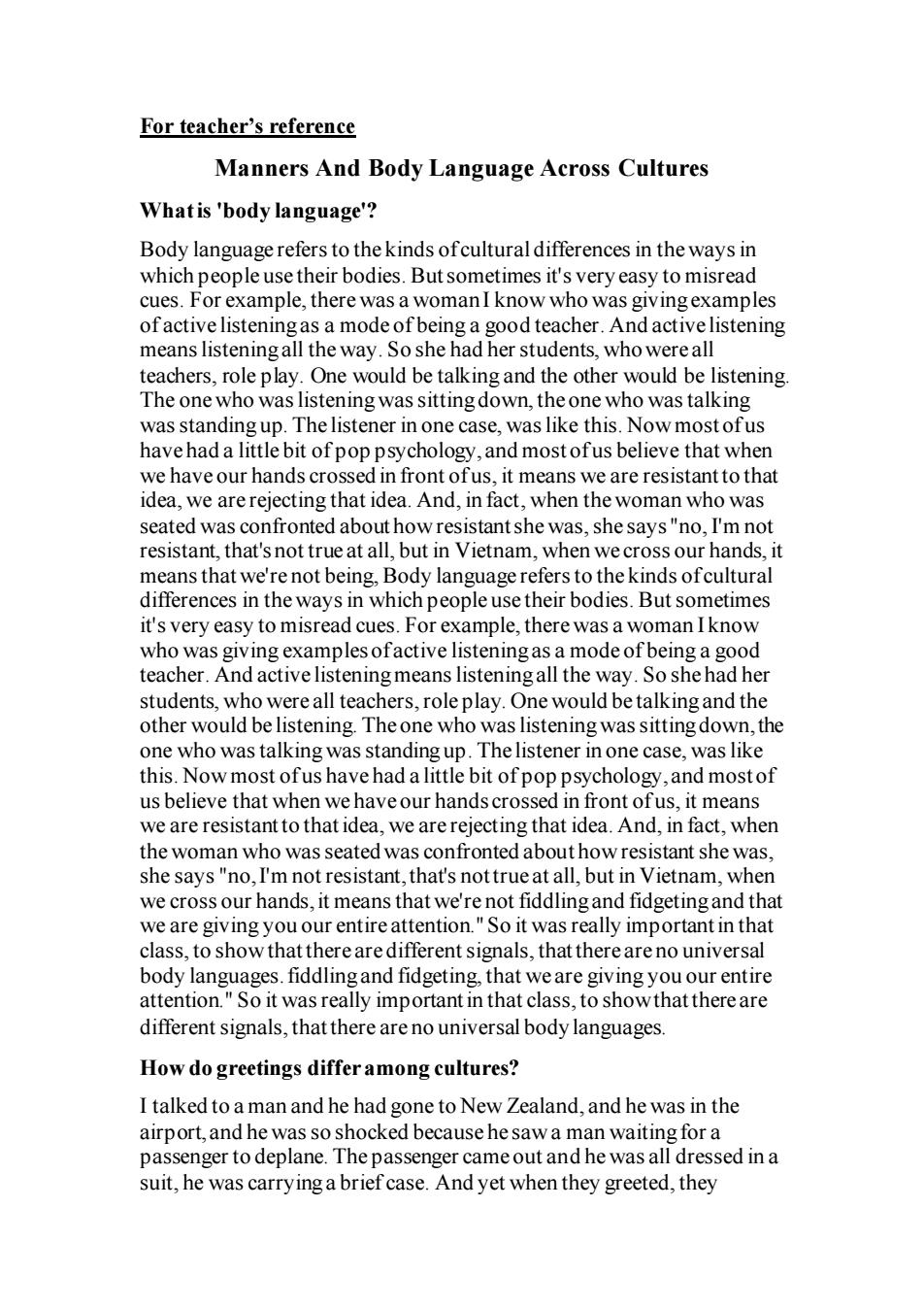正在加载图片...

For teacher's reference Manners And Body Language Across Cultures Whatis'body language'? Body language refers to the kinds ofcultural differences in the ways in which people use their bodies.But sometimes it's very easy to misread cues.For example,there was a womanI know who was givingexamples ofactive listeningas a mode of being a good teacher.And active listening means listeninga ll the way So she had her student s,who wer re all teachers,role play.One would be talking and the other would be listening. The one who was listening was sitting down,the one who was talking was standing up.The listener in one case,was like this.Now most ofus have had a little bit of pop psychology,and most ofus believe that when we have our hands crossed in front ofus.it means we are resistantto that idea,we are rejecting that idea.And,in fact,when the woman who was seated was confronted about how resistantshe was,shesays"o.I'mnot resistant,that's not true at al t in Vietnam, when we cros ou r hands means that we're not being,Body language refers to the kinds ofcultural differences in the ways in which people use their bodies.But sometimes it's very easy to misread cues.For example,there was a woman Iknow who was g ing examples ofactive listeningas mode of being a go teacher.And active listening means listening all the way.So she had her students,who were all teachers,role play.One would be talking and the other would be listening Theone who was listening was sitting down,the one who was talking was standing up. The listener in one case,was like this.Now most ofus have had a little bit of pop psychology,and most of us believe that when we have our hands crossed in front ofus,it means we are resistant to that idea,we are rejecting that idea.And,in fact,when the woman who was seated was confronted about how resistant she was, she says "no,I'm not resistant,that's not true at all,but in Vietnam,when we cross our hands.it means that we're not fiddling and fidgeting and that we are giving you our entire attention."So it was really important in that class,to show that there are different signals,that there are no universal body languages.fiddlingand fidgeting,that we are giving you our entire attention."So it was really important in that class,to showthat there are different signals,that there are no universal body languages How do greetings differ among cultures? I talked to a man and he had gone to New Zealand,and he was in the airport,and he was so shocked because he saw a man waiting for a passenger to deplane.The passenger came out and he was all dressed in a suit,he was carrying a brief case.And yet when they greeted,they For teacher’s reference Manners And Body Language Across Cultures What is 'body language'? Body language refers to the kinds of cultural differences in the ways in which people use their bodies. But sometimes it's very easy to misread cues. For example, there was a woman I know who was giving examples of active listening as a mode of being a good teacher. And active listening means listening all the way. So she had her students, who were all teachers, role play. One would be talking and the other would be listening. The one who was listening was sitting down, the one who was talking was standing up. The listener in one case, was like this. Now most of us have had a little bit of pop psychology, and most of us believe that when we have our hands crossed in front of us, it means we are resistant to that idea, we are rejecting that idea. And, in fact, when the woman who was seated was confronted about how resistant she was, she says "no, I'm not resistant, that's not true at all, but in Vietnam, when we cross our hands, it means that we're not being, Body language refers to the kinds of cultural differences in the ways in which people use their bodies. But sometimes it's very easy to misread cues. For example, there was a woman I know who was giving examples of active listening as a mode of being a good teacher. And active listening means listening all the way. So she had her students, who were all teachers, role play. One would be talking and the other would be listening. The one who was listening was sitting down, the one who was talking was standing up. The listener in one case, was like this. Now most of us have had a little bit of pop psychology, and most of us believe that when we have our hands crossed in front of us, it means we are resistant to that idea, we are rejecting that idea. And, in fact, when the woman who was seated was confronted about how resistant she was, she says "no, I'm not resistant, that's not true at all, but in Vietnam, when we cross our hands, it means that we're not fiddling and fidgeting and that we are giving you our entire attention." So it was really important in that class, to show that there are different signals, that there are no universal body languages. fiddling and fidgeting, that we are giving you our entire attention." So it was really important in that class, to show that there are different signals, that there are no universal body languages. How do greetings differ among cultures? I talked to a man and he had gone to New Zealand, and he was in the airport, and he was so shocked because he saw a man waiting for a passenger to deplane. The passenger came out and he was all dressed in a suit, he was carrying a brief case. And yet when they greeted, they